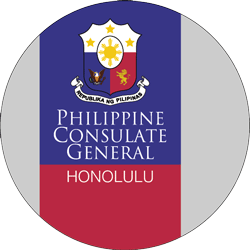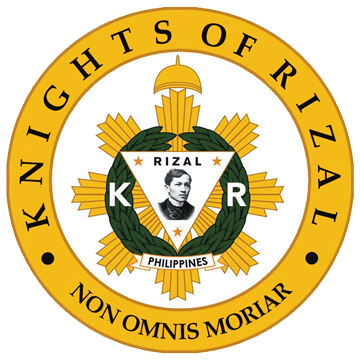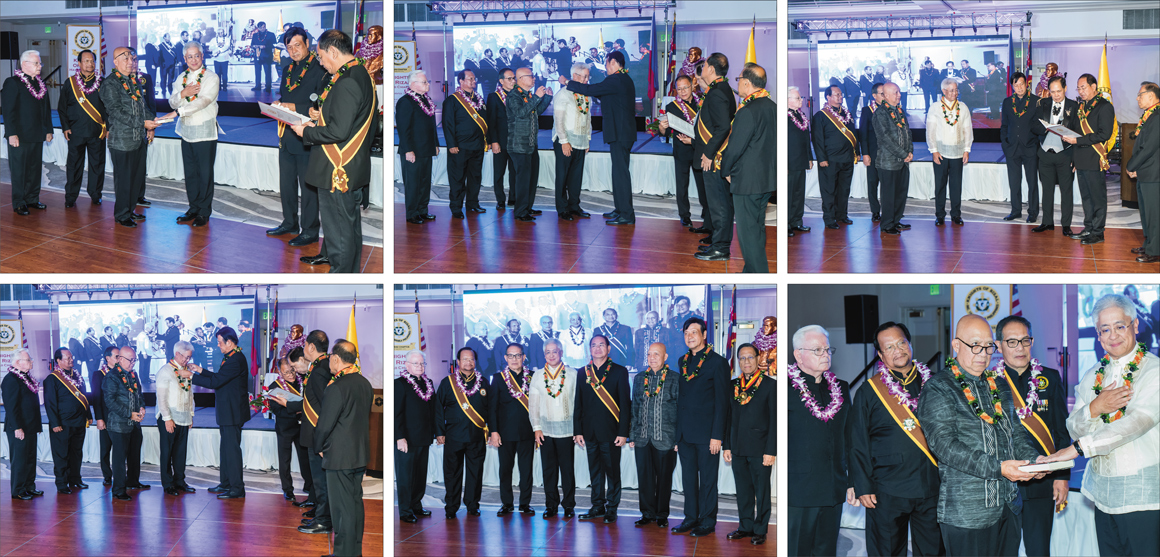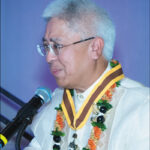
Knights of Rizal’s Western USA Region
For this issue, I wish to share with The Fil-Am Voice’s readers the following remarks I delivered last September 3 during the 9th Regional Assembly for Western USA of the Knights of Rizal held at the Hyatt Regency in Waikīkī. Again, our hearts go out to the families and friends affected by the devastating wildfires.

“Magandang gabi po sa inyong lahat. It is an honor to join you tonight as you convene this 9th conference for the Western USA Region.
I am truly humbled for this recognition. Marami pong salamat. I have always admired what the Knights of Rizal does and felt that your activities are truly noble objectives—propagating the teachings and values of our national hero. I can only aspire to live up to his ideals and do what’s expected of being a member of your esteemed association.
Before we begin, may I ask for one minute of silence for our fellow Filipinos on Maui who were affected by the wildfires last August 8.
The past four weeks have been quite trying, given what transpired in Lahaina. It really caught us all off-guard. Like many, I started hearing of the wildfires in the news. And as part of the Consulate’s contingency measures, I started calling our contacts in the Filipino community on the island to get a first-hand account of what was transpiring and see how our kababayans were faring. They included representatives of the Maui Filipino Chamber of Commerce, The Fil-Am Voice, Binhi at Ani Filipino Community Center, and Maui County Mayor’s Office. Expectedly they were still in shock and very emotional. And, because it was quite early, no details could be provided yet.

Step two was to try and do our part in urging our countrymen in affected areas to take necessary precautions and heed the advice of local authorities. For whatever its worth, advisories were posted on our website and social media accounts, including information on where to seek help and assistance, and ways to find those unaccounted for.
The fire just spread so rapidly due to the prevailing winds and because of the dry conditions, the tragic outcome is that, to date, there have been 115 fatalities and over 380 people still missing. Sadly, many of those who perished were the elderly, probably because they had a harder time physically evacuating or they were reluctant to leave homes that they worked hard to save for and build.
And because of the significant Filipino population in Hawai‘i, including Maui, and particularly Lahaina, it was inevitable that there would be many affected from our community. According to Census figures, some forty percent of respondents in Lahaina identified themselves to be of Filipino descent. Most were immigrants and legal permanent residents.
A few days after the blaze, when the Hawai‘i state government gave the all clear for travelers to enter Maui, I led a team of four people from the Consulate to render consular and assistance-to-nationals services. In a day and a half, we attended to close to 70 people, principally residents of the burn area. Most had lost their homes and belongings, including their Philippine passports, which were important means of identification. Equally important was to lend an ear and just listen to their accounts, following their horrific ordeal. I could see in their faces the trauma they experienced, with some whose hands were still trembling as they accomplished certain forms. I could only console them and do our small part.

Photo courtesy the Philippine Consulate
During that trip, I was also able to see several Maui County officials and members of the Filipino community. Among them was a group of Filipino teachers, who had just arrived on Maui under the Exchange Visitor Program. Imagine just being here a few weeks and you are confronted with this disaster of historic proportions. Two of these teachers were staying in Lahaina, renting a place there when, on that fateful day, their landlady told them that they had to evacuate. So they hurriedly gathered their most important belongings, but also had the presence of mind to check on their elderly neighbor, who they had just met. After knocking on his door, the person was apparently unaware of the magnitude of the fire. Subsequently, the teachers were able to lead him to safety. What an amazing story! Newcomers in the country, already saving a person’s life!
So amidst the tragedy, you will find stories of courage, bravery and inspiration. Most evident was the so-called Aloha or ‘Ohana spirit, the equivalent of which is our Bayanihan spirit. I saw this in the shelters, in the aid facilities, and among the volunteers, including Filipinos who spearheaded fundraising activities, distributed relief goods and even opened their homes to people who were displaced. Dr. Rizal would have been proud of this.
This September 21, I will be returning to Maui with a larger consular team and we will stay for a longer period so we can attend to everyone who needs our services. We will also invite representatives of other U.S. agencies, so the various questions of those in attendance can be responded to in one venue.
Dealing with such challenges in Hawai‘i was one of the last things I expected. But this is what I signed up for as a Foreign Service officer and as a public servant. And I still believe that working in government is a noble calling and one that is rewarding especially when you see how our work makes an impact, no matter how small, in other people’s lives, just as the Knights of Rizal does for its members and beneficiaries of its good work.
Maraming salamat ulit at mabuhay po kayo.”
 Emil T. Fernandez is the current Consul General of the Philippines stationed in Honolulu. He graduated from the Ateneo de Manila University with a Bachelor of Arts degree in Management Economics. Prior to his appointment to Hawai‘i, Fernandez served as Deputy Consul General in Frankfurt, Germany. His other foreign assignments included Washington, D.C. (2010–2016), Santiago, Chile (2005–2008) and Caracas, Venezuela (2002–2005). In Manila, Fernandez held several important positions, including Executive Director of the Office of Asian & Pacific Affairs (2016–2018), Director for Southern Europe of the Office of European Affairs (2009–2010), Special Assistant to the Undersecretary for International Economic Relations (2008–2009) and Acting Director of the Office of ASEAN Affairs (1999–2001).
Emil T. Fernandez is the current Consul General of the Philippines stationed in Honolulu. He graduated from the Ateneo de Manila University with a Bachelor of Arts degree in Management Economics. Prior to his appointment to Hawai‘i, Fernandez served as Deputy Consul General in Frankfurt, Germany. His other foreign assignments included Washington, D.C. (2010–2016), Santiago, Chile (2005–2008) and Caracas, Venezuela (2002–2005). In Manila, Fernandez held several important positions, including Executive Director of the Office of Asian & Pacific Affairs (2016–2018), Director for Southern Europe of the Office of European Affairs (2009–2010), Special Assistant to the Undersecretary for International Economic Relations (2008–2009) and Acting Director of the Office of ASEAN Affairs (1999–2001).
